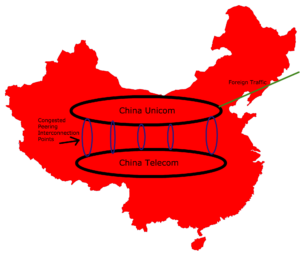People always ask why accessing Chinese sites overseas, and foreign sites from within China, are so slow. Besides the chokepoints of the the Great Firewall, traffic peering is a big problem.
The short of it is: peering is the interconnection of Internet networks between Internet Service Providers (ISPs) so as to more easily exchange data to all. Peering between ISPs allows the Internet to exist as we know it today. You can read about it more coherently on Wikipedia. Essentially, ISPs pay each other to exchange data so we can connect to almost every public network in the world.
In China, there are only three main state-backed ISPs, China Telecom, China Mobile and China Unicom. Within China, traffic exchanged is very inexpensive to peer, but congested at the interconnect points. An article from, Dr. Peering, a peering discussion site, describes the congestion of the Chinese Internet:

To make matters worse, Chinese ISPs charge large fees for foreign network peering. As VPN Reviewer describes it:
Another Dr. Peering article describes how transit of data from Europe to China is cheaper than Hong Kong to Guangzhou, just over the border. As a result, the high cost of peering and the small number of peering locations within China itself result in web connections in and out of the country being relatively slow. Slow and expensive peering could also contribute to the high percentage of overall Internet traffic never leaving China in the first place.

As such, Content Delivery Networks (CDNs) that cache site data inside and outside of China are popular services to ensure good peering connections. ChinaCache, a popular CDN provider that caches data inside the Great Firewall, as well as overseas, allows for Chinese sites to load quickly outside the country. Conversely, it allows for foreign sites to load quickly in China, after of course having its BeiAN/ICP license approved by the local government. Other similar services are the CloudFlare/Baidu joint-venture that adds mainland Chinese support to the American-based provider.
So, while the Internet infrastructure in China might be slow, there’s still opportunities for other industries to find a way to connect everyone together.
For more information about the Internet and China on this blog, check out my other articles on this topic.




One thought on “Peering and the Chinese Internet”